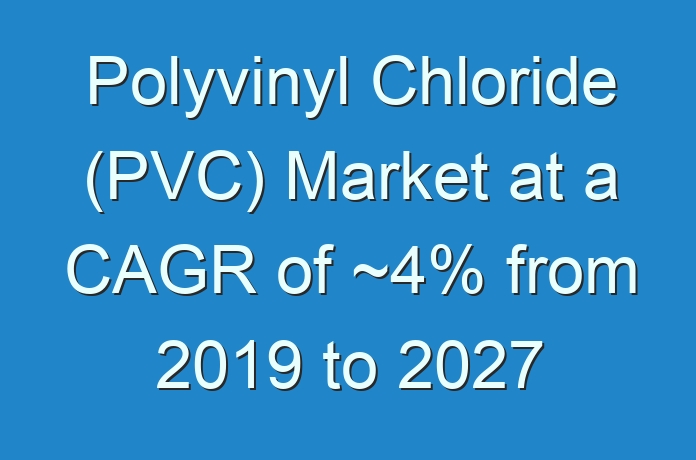
Polyvinyl Chloride (PVC) Market: Key Highlights
- The global polyvinyl chloride (PVC) market was valued at ~US$ 63 Bn in 2018, and is anticipated to expand at a CAGR of ~4% from 2019 to 2027. PVC is used in packaging, owing to its excellent organoleptic properties. It does not impart any taint or taste to foodstuff. The global packaging market is driven by the rise in population, and growth in urbanization and trade. Globally, increasing online trade is further driving the demand for packaging. Products are also being consumed on-the-go. This is boosting the demand for food service packaging and different sizes of packaging. In turn, this is likely to fuel the global packaging market, and thereby propel the polyvinyl chloride market.
Key Drivers of Polyvinyl Chloride Market
- PVC offers excellent electrical insulation properties, making it ideal for cabling applications. It has good impact strength and is weatherproof, and is thus ideal for usage in construction products. PVC has received approval from the food contact and medical regulatory authorities in Europe. Therefore, polyvinyl chloride is commonly employed in packaging in food and healthcare industries.
Request PDF Brochure –
https://www.transparencymarketresearch.com/sample/sample.php?flag=covid19&rep_id=60114
- Polyvinyl chloride is easy to process, long lasting, tough, and light. Therefore, it is ideal for usage in the building & construction industry. PVC consumes less primary energy during production as compared to other commodity plastics. The unique properties of polyvinyl chloride are driving its demand in different sectors such as construction, electrical & electronics, health care, footwear, and packaging.
Shift toward Eco-Friendly PVC to Offer Attractive Opportunities
- Ethylene-vinyl acetate (EVA) is the copolymer of ethylene and vinyl acetate. EVA is being used since several years, primarily in non-building materials, such as toys and athletic shoes. It is occasionally used as a protective film or binder. EVA is commonly employed in footwear components, flexible hoses, automobile bumpers, toys and athletic goods, molded automotive parts, flexible packaging, and films. It is flexible, resilient, and tough at low and moderate temperatures, and also crack-resistant.
REQUEST FOR COVID19 IMPACT ANALYSIS –
https://www.transparencymarketresearch.com/sample/sample.php?flag=covid19&rep_id=60114
Volatility in Prices of Raw Materials
- The operating rates for chlorine have been low across most parts of Asia Pacific since the last few years due to production outages.
- Ethylene is a major raw material used in the production of PVC. Volatility in the prices of ethylene poses a challenge to the demand-supply curve. Volatility in the prices of raw materials such as chlorine and ethylene leads to considerable volatility in the prices of PVC. The shift from conventional PVC to eco-friendly PVC such as EVA, PEVA, PVA and PVB is creating opportunities for the polyvinyl chloride market.
More Trending Reports by Transparency Market Research –
Asia Pacific Dominates Polyvinyl Chloride Market
- Asia Pacific is estimated to be a highly attractive region of the global polyvinyl chloride market during the forecast period. The region accounted for a large share of the global polyvinyl chloride market in 2018. The PVC market in Asia Pacific is anticipated to expand at a rapid pace during the forecast period. The food & beverage industry in Asia Pacific is expanding at a rapid pace, owing to the high population in countries in the region. This is boosting the polyvinyl chloride market in Asia Pacific.
- North America is projected account for a significant share of the global polyvinyl chloride market during the forecast period. The residential sector is prominent in the U.S. The healthcare industry in North America has been transforming. PVC is widely used in surgeries in the healthcare industry, which is propelling the polyvinyl chloride market in the region.
Rigid Type Holds Major Share of PVC Market
- Rigid is expected to be a highly attractive segment of the polyvinyl chloride market during the forecast period. The segment accounted for a major share of the polyvinyl chloride market in 2018. The rigid segment is anticipated to expand rapidly during the forecast period. Rigid PVC is processed through thermoplastic methods. It is non-flammable, and offers good dimensional stability and resistance to weathering.
Top Three Players Accounted for Major Market Share in 2018
- Prominent players operating in the global polyvinyl chloride market include Shin-Etsu Chemical Co., Ltd., Formosa Plastics, Inovyn, ChemChina, Mexichem S.A.B. de C.V., Westlake Chemical Corporation, and Occidental Petroleum Corporation. The global reach of these companies and their focus on a wide range of end-user industries are responsible for their large share. Companies are engaged in efficient and well-developed planning and designing. They are investing in the development of new products that are eco-friendly and recyclable in order to meet customer requirements.
- ChemChina is one of the top three producers of polyvinyl chloride in China; however, the company’s production is based on coal. The production capacity of its four PVC subsidiaries — Shenyang Chemical Co. (Shenyang, China), Dezhou Shihua Chemical Co. (Dezhou, China), Hebei Shenghua Chemical Industry (Zhangjiakou, China), and Haohua Yuhang Chemical Co. (Jiaozuo, China) — collectively exceeds 1 MMt per year of PVC and 1 MMt per year of caustic soda.
- On November 28, 2016, Mexichem S.A.B. de C.V. acquired Vinyl Compounds Holdings Ltd., a leading U.K.-based manufacturer of technical polyvinyl chloride compounds that provides services to a wide range of industries such as building & construction, pipes & profiles, footwear, and consumer goods.





